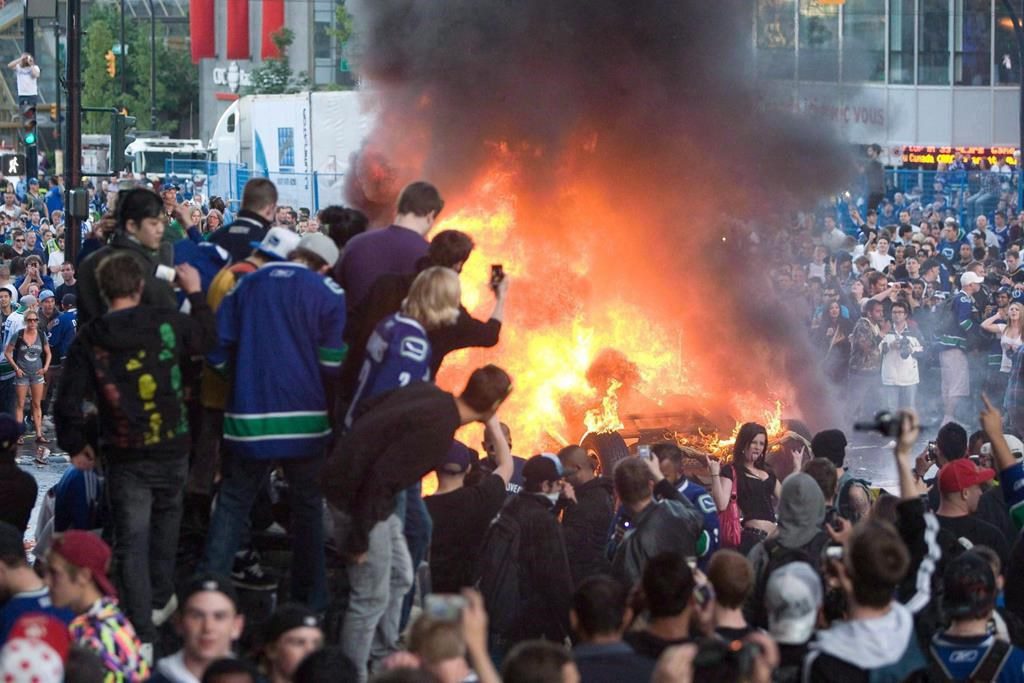VANCOUVER — Simon Coutts remembers being “heckled” by passersby in 2011 as he boarded up his bike shop on Vancouver’s Robson Street before the Canucks’ Game 7 Stanley Cup loss to the Boston Bruins, that would spur hordes of drunken fans to riot.
Simon’s Bike Shop had been in business since 1986, and Coutts said the Stanley Cup riot in 1994 made him take precautions when the Canucks made the final again.
“In 2011, I was out on the street every day. I was watching the parties. watching the people,” Coutts said on Tuesday. “There was just too many people out of control downtown and there’s drinking and all sorts of stuff … and then I guess you could say all hell broke loose.”
That night is on his mind again, as the Canucks enter the next round of the playoffs against the Edmonton Oilers tonight.
He’s not alone in reflecting on Vancouver’s troubled relationship with the playoffs. Vancouver Mayor Ken Sim acknowledged the riots at a news conference last month, saying the city had “a history” and they would need to make sure any playoffs viewing event would be very safe.
“We’re not just gonna say ‘hey let’s throw a party, this time’s gonna be different,'” he said. “What we learned in the past was, that’s what they thought in 2011.”
On Monday, Sim said the city was “exploring potential public viewing opportunities” for Canucks games.
Ian Tostenson, the CEO of the BC Restaurant & Food Services Association, said in an interview that he supports the mayor’s “cautious approach” to Stanley Cup celebrations given the city’s “track record.”
The viewing parties for away games, he said, offer people a more “controlled” environment, rather than inviting thousands of people downtown as happened in 2011.
“Big events like FIFA and big concerts and stuff, we’re able to do that really well,” he said. “I just worry that if we just kind of recklessly sort of go, throw some TV’s up and invite, you know, 20,000 people on Georgia Street again, I just predict there’s going to be trouble somewhere.”
He said holding another large public viewing party downtown carries risks because if “something goes terribly wrong, it’s just going to set us back years and I think we’ve made some progress here.”
Coutts also said that viewing parties at Rogers Arena this year are a better bet than having public events downtown, recalling the chaos that broke out the last two times the Canucks made it to the final.
He remembers the fires, the broken windows at The Bay, London Drugs and a neighbouring pizza shop, and the “intense” moments when rioters tried to pry off the plywood he’d put up to protect his store.
His daughter called him “bawling” with tears, imploring him to come home, but he stayed to protect the store.
Thirteen years later, he’s still a fan and a Canucks season ticket holder, he said.
On June 15, 2011, the day of Game 7, Vancouver Police Department spokesman Lindsey Houghton said there was “a different atmosphere” in the city compared with 1994, and that police were confident there wouldn’t be another riot after the success of the Olympics a year before.
A report produced after the 2011 riot entitled “The Night the City Became a Stadium,” laid out how those predictions went up in flames.
“Vancouver tried to do a good thing and found itself in an almost impossible situation,” said the report, commissioned by the province and the City of Vancouver. “There were too many people, not too few police. No plausible number of police could have prevented trouble igniting in the kind of congestion we saw on Vancouver streets that night.”
Report authors John Furlong and Douglas Keefe said alcohol and binge drinking that night “were like gasoline on a fire.”
“Alcohol fuelled nasty behaviour and triggered law breaking that surprised and galled us all.”
Police combed through CCTV video and asked the public for help in identifying suspects, resulting in hundreds of criminal charges.
While Vancouver mulls the idea of public viewing events, other Metro Vancouver cities including Delta, Maple Ridge and New Westminster have made plans for playoff viewing parties.
For Coutts, lingering memories of the 2011 riot make him think a “big party” isn’t a good idea, but the family-friendly indoor gatherings at Rogers Arena downtown have been both controlled and successful.
“Right now, my feeling is a good feeling, so I don’t have the same feeling I had last time,” he said. “No one wants a repeat.”
This report by The Canadian Press was first published May 8, 2024.
Darryl Greer, The Canadian Press





